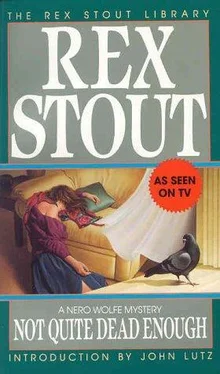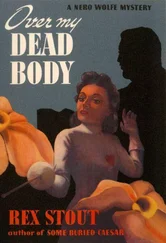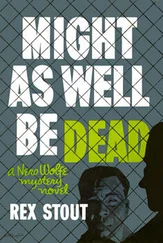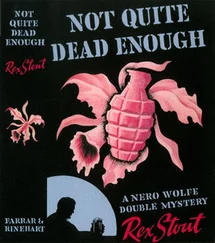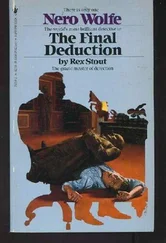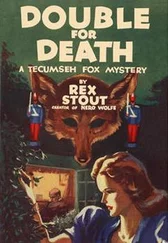Rex Stout - Not Quite Dead Enough (The Rex Stout Library)
Здесь есть возможность читать онлайн «Rex Stout - Not Quite Dead Enough (The Rex Stout Library)» весь текст электронной книги совершенно бесплатно (целиком полную версию без сокращений). В некоторых случаях можно слушать аудио, скачать через торрент в формате fb2 и присутствует краткое содержание. Жанр: Старинная литература, en-GB. Описание произведения, (предисловие) а так же отзывы посетителей доступны на портале библиотеки ЛибКат.
- Название:Not Quite Dead Enough (The Rex Stout Library)
- Автор:
- Жанр:
- Год:неизвестен
- ISBN:нет данных
- Рейтинг книги:3 / 5. Голосов: 1
-
Избранное:Добавить в избранное
- Отзывы:
-
Ваша оценка:
- 60
- 1
- 2
- 3
- 4
- 5
Not Quite Dead Enough (The Rex Stout Library): краткое содержание, описание и аннотация
Предлагаем к чтению аннотацию, описание, краткое содержание или предисловие (зависит от того, что написал сам автор книги «Not Quite Dead Enough (The Rex Stout Library)»). Если вы не нашли необходимую информацию о книге — напишите в комментариях, мы постараемся отыскать её.
Not Quite Dead Enough (The Rex Stout Library) — читать онлайн бесплатно полную книгу (весь текст) целиком
Ниже представлен текст книги, разбитый по страницам. Система сохранения места последней прочитанной страницы, позволяет с удобством читать онлайн бесплатно книгу «Not Quite Dead Enough (The Rex Stout Library)», без необходимости каждый раз заново искать на чём Вы остановились. Поставьте закладку, и сможете в любой момент перейти на страницу, на которой закончили чтение.
Интервал:
Закладка:
Ryder’s hand came up holding the grenade. “Major Goodwin just returned it, sir.”
“Isn’t it one of those H14’s?”
“Yes, sir. As you know, he found them. I gave him permission to keep one.”
“You did? I didn’t. Did I?”
“No, sir.”
Ryder opened a drawer of his desk, put the grenade in it, and closed the drawer. General Fife went to a chair and twirled it around and sat on it assbackwards, crossing his arms along the top of the chair’s back. The understanding was that he had formed that habit after seeing a picture of Eisenhower sitting like that, which I record without prejudice. He was the only professional soldier in the bunch there present. Colonel Ryder had been a lawyer out in Cleveland. Colonel Tinkham, who looked like a collection of undersized features put together at random in order to have somewhere to stick a little brown mustache, had had some kind of a gumshoe job for a big New York bank. Lieutenant Lawson had just come up from Washington two weeks before and was still possibly mysterious personally, but not ancestrally. He was Kenneth Lawson, Junior; Senior being the Eastern Products Corporation tycoon who had served his country in its hour of need by lopping one hundred thousand dollars off his own salary. All I really knew about Junior was that I had heard him trying to date Sergeant Bruce his second day in the office and getting turned down.
The only chair left was over by the steel cabinets, occupied by a small pigskin suitcase. Trying to make just the right amount of noise and commotion for a major under the circumstances, I deposited the suitcase on the floor and sat down.
Meanwhile General Fife was speaking. “Where have you got to? Where’s the public? Where’s the press? No photographers?”
Lieutenant Lawson started to grin, caught Colonel Ryder’s eye, and composed his handsome features. Colonel Tinkham moved the tip of his forefinger along the grain of his mustache, right and left alternately, which was his number-one gesture for conveying the impression that he was quite unperturbed.
“We haven’t got anywhere, sir,” Ryder said. “We haven’t started. Wolfe just got here. Your other questions-”
“Not for you,” Fife said curtly. He was looking, conspicuously, at John Bell Shattuck. “Public servant, and no public? No microphones? No newsreel cameras? How are the people to be informed?”
Shattuck didn’t even blink, let alone try to return the punch. “Now look here,” he said reproachfully, “we’re not as bad as that. We try to do our duty, and so do you. Sometimes I think it might be a good plan for us to take over the armed forces for a period, say a month-”
“Good God.”
“-and let the generals and admirals take over the Capitol for the same period. No doubt we would all learn something. I assure you I understand perfectly that this matter is confidential. I have not even mentioned it to the members of my committee. I thought it my duty to consult you, and that’s what I’m doing.”
Fife’s gaze at him showed no sign of melting into fondness. “You got a letter.”
Shattuck nodded. “I did. An anonymous unsigned type-written letter. It may be from a crackpot, it probably is, but I didn’t think it wise to ignore it.”
“May I see it?”
“I have it,” Colonel Ryder put in. He took a sheet of paper from under a weight on his desk and stepped across to pass it to his superior. But Fife was using his hands to pat the pockets of his jacket.
“Left my glasses upstairs. Read it.”
Ryder did so.
“Dear sir: I address this to you because I understand that your investigating committee is authorized to inquire into matters of this sort. As you know, in the emergency of the war the Army is being entrusted with the secrets of various industrial processes. This practice is probably justified in the circumstances, but it is being criminally abused. Some of the secrets, without patent or copyright protection, are being betrayed to those who intend to engage in post-war competition of the industries involved. Values amounting to tens of millions of dollars are being stolen from their rightful owners.
“Proof will be hard to get because of the difficulty of showing intent to defraud until it is put into practice after the war. I give you no details, but an honest and rigorous investigation will certainly disclose them. And I suggest a starting point: the death of Captain Albert Cross of Military Intelligence. He is supposed to have jumped, or fallen by accident, from the twelfth floor of the Bascombe Hotel in New York day before yesterday. Did he? What sort of inquiry had he been assigned to by his superior officers? What had he found out? You might start there.
“A Citizen”
Silence. Dead silence.
Colonel Tinkham cleared his throat. “Well-written letter,” he observed, in the tone of a teacher commending a pupil for a good composition.
“May I look at it?” Nero Wolfe inquired.
Ryder handed it to him, and I got up and crossed the room to take a squint over Wolfe’s shoulder. Tinkham and Lawson got the same notion and did likewise. Wolfe considerately held it at an angle so we could all see. It was a plain sheet of ordinary bond paper, and the text was single-spaced neatly in the center of the sheet with no errors or exings. From habit and experience I noted two mechanical peculiarities: the c hit below the line; and the a was off to the left-in war , for instance, it touched the top corner of the w . I was going on from there when Tinkham and Lawson finished and moved away, and Wolfe handed the sheet to me to return to Ryder.
“Hot stuff,” Lawson said, sitting down. “He could a tale unfold, but he doesn’t. Nothing but insinuations.”
Fife asked him sarcastically, “Does that close the matter, Lieutenant?”
“Sir?”
“I ask, is your verdict final, or are we to be permitted to proceed?”
“Oh.” Lawson showed color. “I beg your pardon, sir. I was merely observing-”
“There’s another way to observe. Look and listen.”
“Yes, sir.”
“If I may be allowed-” Colonel Tinkham offered.
“Well?”
“Interesting points about that letter. It was written by a person who is incisive and highly literate and who also types expertly. Or it was dictated to a stenographer, which doesn’t seem likely. The margining at the right is remarkably even. And the double spaces after periods-”
Wolfe made a noise, and Fife glanced at him. “What?”
“Nothing,” Wolfe said. “I suppose I wouldn’t mind if this chair were properly constructed and of a proper size. I suggest, if the discussion is to be at kindergarten level, that we all sit on the floor.”
“Not a bad idea. We may come to that.” Fife turned to Shattuck. “When did you get the letter?”
“In the mail Saturday morning,” Shattuck told him. “Plain envelope of course, address typed, marked personal. Postmarked New York, Station R, 7:30 p.m. Friday. My first impulse was to turn it over to the F.B.I., but I decided that wouldn’t be fair to you fellows, so I telephoned Harold-Colonel Ryder. I was coming to New York today anyway-speaking at a dinner tonight of the National Industrial Association-and we agreed this was the way to handle it.”
Читать дальшеИнтервал:
Закладка:
Похожие книги на «Not Quite Dead Enough (The Rex Stout Library)»
Представляем Вашему вниманию похожие книги на «Not Quite Dead Enough (The Rex Stout Library)» списком для выбора. Мы отобрали схожую по названию и смыслу литературу в надежде предоставить читателям больше вариантов отыскать новые, интересные, ещё непрочитанные произведения.
Обсуждение, отзывы о книге «Not Quite Dead Enough (The Rex Stout Library)» и просто собственные мнения читателей. Оставьте ваши комментарии, напишите, что Вы думаете о произведении, его смысле или главных героях. Укажите что конкретно понравилось, а что нет, и почему Вы так считаете.
